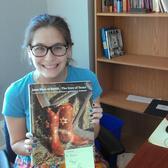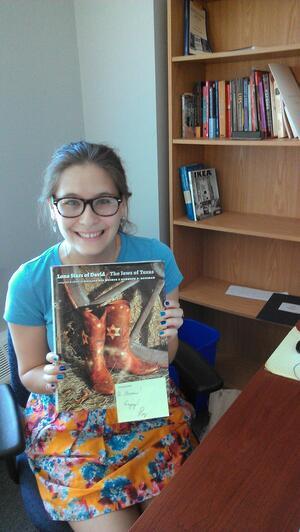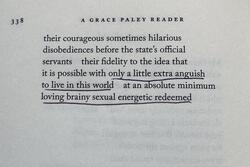Being Texan and Jewish
Followers of our social media might have noticed, I recently received a gift in the mail here at JWA.
A follower of JWA read about me in a recent newsletter and asked if I had read the book The Lone Stars of David: The Jews of Texas. While I have read through most of Deep in the Heart: The Lives and Legends of Texas Jews, this book was new to me. I instantly Googled the title, and was excited to someday read the book. Then, I received it in the mail! The same woman who initially asked me if I had read it generously gave me her copy, and it is now sitting on my shelf waiting for me to open it.
Now you might be wondering: “Miriam, you’re working at the Jewish Women’s Archive in Brookline, Massachusetts, what do you care about Texas?” It’s simple: I consider myself a Texan.
I was born in Massachusetts, but at the age of eighteen months, my family moved southwest to Texas. A sign my father keeps in his office perfectly sums up my relationship with Texas: “I wasn’t born in Texas, but I got here as fast as I could.” I may not look or sound like it, but I am a proud daughter of Texas. My mother was born and raised in Texas, so I think I have inherited this pride from her.
“But Miriam,” you might add, “You’re Jewish! There aren’t any Jews in Texas, right?” On the contrary! Texas has an incredible history of Jewish citizens. From pirates to doctors, Texas has welcomed Jews of all varieties into its vast arms. The history of the arrival of Jewish families to Texas in the late nineteenth/early twentieth century isn’t too different from the tales of Jews immigrating to New York. I was about to write a bit more about this, but I think I’ll leave that for Part Two of this post and to an expert on the subject.
What is it about being Texan and Jewish that fills me with such pride? I think it’s the unexpectedness of it. I enthusiastically say, “Howdy y’all!” to friends and receive strange stares and sudden cases of the giggles. When I tell people where I’m from they reply, “You don’t sound Texan…or look Texan.” In the same way, people are often told they don’t “look” or “sound” Jewish. What does this even mean? Why are people still bogged down by stereotypes of cowboys and yentas and all other characters associated with Texas and Judaism? Why do I need to prove my Texan-ness or Jewish-ness with how I speak or act or look?
So, from now on, when someone divulges their origins to you, instead of saying, “Whoa, you don’t look/sound/act (fill in the blank),” ask questions! Ask, “Has your family always lived in _____?” or “What’s your favorite part about being _____?” You get the idea.
For those who are asked the questions, relish your history. Study it, revel in it, and don’t be afraid of not knowing all the answers.
When Miriam has questions about her Texan roots, she turns to her mother. Check out Lisa Stone's views on growing up Texan and Jewish.








Great article Miriam!